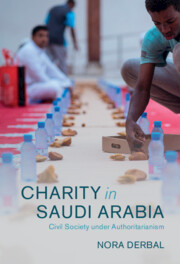‘Nora Derbal presents a fascinating study of civil society in the authoritarian context of Saudi Arabia - a topic that is very much under-researched. It's highly original, impressively written and meticulously detailed. This is truly a piece of social science at its absolute best.’
Paul Aarts - University of Amsterdam
‘A ground-breaking study of Saudi charity organizations interwoven with history, contemporary developments, and gender analysis. Comprehensively and holistically researched, rich in statistics and personal lived experience, it is a compelling read for anyone interested in the inner workings of Saudi society and the economy outside of official institutions and narratives.’
Natana Delong-Bas - Boston College
‘Nora Derbal’s book is timely, well-written and based on extensive fieldwork in Saudi Arabia. It is a welcome addition to the literature that places civil society initiatives in Saudi Arabia, especially in the Hijaz, in a wider socio-political context and problematises simplistic notions of state-society relations and authoritarian rule.’
Toby Matthiesen - Ca’ Foscari University
‘a penetrating addition to the research literature on charity'
Jonathan Benthall
Source: Books of the Year 2022, Times Literary Supplement
‘An impressive bibliography, which interestingly leaves much space for works in Arabic by Saudi historians as well as interpretations by Saudi activists themselves… Its ethnographic dimension is precious at a time when the conditions for independent research are increasingly difficult for all. It can thus serve as a guidebook for graduate students.’
Laurent Bonnefoy
Source: Arabian Humanities
‘Derbal has written a brilliant, innovative and ground-breaking book on aspects of charity and civil society in Saudi Arabia and how it is faring under the authoritarian regime of MbS. The book is packed with her detailed and perceptive field work and research in the Hejaz from 2009 to 2020. It makes a huge contribution to the academic study of charitable work in Saudi Arabia.’
Caroline Montagu
Source: Arab Digest
‘Derbal hits out effectively against the ‘culturalist exceptionalism’ that still mars some popular descriptions of the Arab world. As a contribution to the understanding of the Gulf region, she provides a ‘bottom-up’ ethnographic corrective to a research corpus that has been more concerned with relationships among elites. But students of philanthropy as a universal human phenomenon will find in her book fresh twists to themes that are familiar in Euro-American debates. … Derbal shows a surefooted sensitivity, questioning stereotypes of Saudi social life without glossing over the inhumanity that its current leadership is capable of.’
Jonathan Benthall
Source: The Middle East Journal
‘… a fascinating volume, well written and easy to read. It addresses aspects of today’s Saudi Arabia which are rarely examined but which are extremely important to understand the social dynamics of the country.’
Helen Lackner
Source: Asian Affairs
‘Derbal challenges the existing literature on Saudi Arabia’s civil society, giving space and voice to some of its more underappreciated actors…For those researching Gulf States’ transformations, and professors teaching philanthropy-related subjects and sociopolitical transformations in the MENA region, Derbal’s work marks a significant contribution to dealing with two - apparently - conflicting concepts: civil society and authoritarianism, from a bottom-up perspective.’
Source: Journal of Muslim Philanthropy and Civil Society
‘… a rich monograph that makes an important contribution to the project of dismantling the figment of Saudi exceptionalism … [it is] a compelling read and deserves a wide audience. Scholars and students interested in civil society, contemporary Saudi Arabia, and the Muslim world will learn much from Derbal’s conversations with Saudis dedicated to improving the lot of their country’s poor.’
David Commins
Source: Die Welt des Islams
‘Apart from its empirical richness and in-depth analysis, Derbal's work provides a comprehensive view of the state, political and social context of Saudi Arabia, in which the activities of the civil society actors are located. While the extensive data collection alone in a country like Saudi Arabia that until a few years ago had hardly been researched locally in the social sciences, this positioning of the individual initiatives in a larger framework and their consideration as its reflection once again significantly increases the added value of the book. In addition, Derbal's study blatantly challenges a number of standard narratives regarding Saudi Arabia in academia and state discourse.’
Philipp Bruckmayr
Source: DAVO Nachrichten
‘Derbal’s book is an example of saudology at its best, and it joins the small golden series of fieldwork-based studies carried out in the 2000s … The study is based on an impressive range of information, including interviews, participant observation, documentation published by the charities, and information obtained from social media. The book is highly recommended reading for anyone who has an interest in modern Saudi Arabia, in civil society under authoritarian rule, and in charity work, which is one of the pillars of any Muslim society.’
Stig Stenslie
Source: Politics, Religion and Ideology



